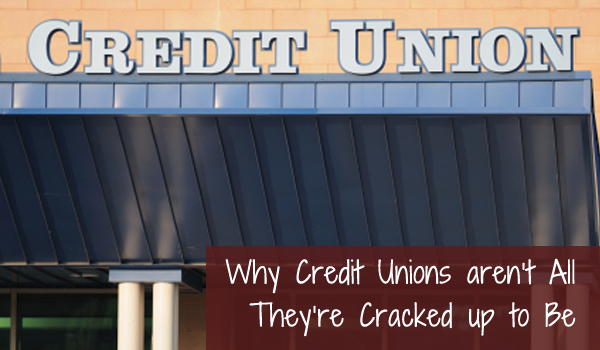
Like most good things in life, credit unions have their catches. Yes, they often have lower loan rates, higher rates on deposit accounts and many of the same banking technology like Online Banking, Mobile Banking and Online Bill Pay.
But there are several downsides to credit unions as well. As the credit union industry continues to grow and earn HUGE profits, now is a great time to examine just how they do that.
- They don’t pay income taxes– as they are classified as non-profit organizations, credit unions are exempt from paying taxes. This exemption means the government loses out on almost $10 BILLION in the next five years at a time when state and federal governments need every cent of funding they can get to provide vital services.
- They have outgrown their original mission– credit unions were established to help members with common affiliations (employers, churches, etc.) conduct banking-type activities. Membership was very selective. Today, membership has opened up to include a much larger field of applicants, at times including anyone who lives in the state the credit union serves (this has occurred in Washington, Vermont and New Hampshire). They were also meant to serve low- and medium-income households, but have instead focused on marketing to higher-income individuals and business customers.
- Mergers have increased the size of credit unions- even though there are about half as many credit unions now as there were two decades ago, their total assets have quadrupled. In many cases, the credit unions formed from mergers not only were much larger than community banks in their area, but held the double advantage of also paying no taxes.
- Credit unions do make a profit- despite their “non-profit” status, credit unions have substantial earnings; they have to for their balance sheets. In 2012, federally insure credit unions earned $8.5 billion in net income, on which they paid $0 in taxes.
- Credit unions try to resemble banks as much as possible– from their buildings and ATMs to the products and services they provide, the strategy for credit unions is to appear as much like a bank to the average consumer as possible. And since they do not pay income taxes, credit unions can provide lower interest rates on loans and higher interest rates on deposit accounts.
In short, credit unions have abused their original mission in an effort to stay competitive with community banks like Northeast Security Bank and others in our communities. They have opened up their membership to practically anyone, and their products and services mirror those of community banks.
While they offer better rates on loans and deposit products, they can only do this because they don’t pay income taxes. This is akin to your neighbors purchasing new cars and building additions to their home because they don’t have to pay taxes while you pinch and save every penny you can.
Before you consider a credit union, be sure to examine the facts first. Check out all the information the American Bankers Association provides to see how credit unions – as beneficial as they seem – are actually hurting our economy, not helping it.
Northeast Security Bank
Equal Housing Lender
Member FDIC
*All facts and figures above from the American Bankers Association
Tags: credit unions, downside of credit unions